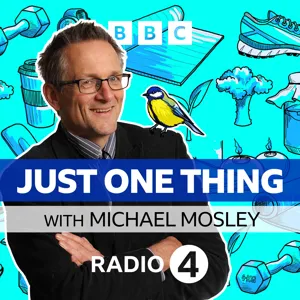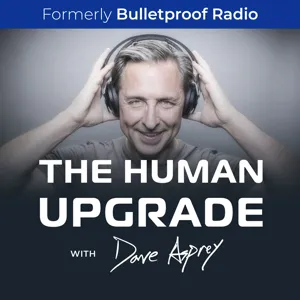Podcast Summary
Convert carbs into resistant starch for health benefits: Cook and cool pasta, then reheat for resistant starch, reducing blood sugar spikes, improving gut health, and potentially lowering inflammation and cancer risk.
Making small adjustments to the way we prepare and consume certain foods, like pasta, can have significant positive impacts on our health. By cooking and cooling pasta, and then reheating it, we can convert the carbs into resistant starch, which acts like fiber and helps reduce blood sugar spikes. This process also feeds the good bacteria in our gut, improving our microbiome and potentially reducing inflammation and the risk of certain cancers. This simple change can be applied to various forms of carbs, including potatoes, rice, and bread. So, if you're looking for a simple and effective way to improve your health, consider adding more resistant starch to your diet. And if you're a carb lover like Jasmine, a dance teacher from Bristol, this could be a great option for you.
Boost gut health with resistant starch: Eating resistant starch from foods like lentils, beans, whole grains, pasta, and potatoes can help reduce cancer risk, lower blood sugars and cholesterol, and reduce inflammation, potentially aiding in managing autoimmune diseases. Cook and cool pasta, potatoes, or rice before reheating to increase resistant starch content.
Incorporating resistant starch into your diet can have numerous health benefits. This type of carbohydrate, which is present in foods like lentils, beans, whole grains, pasta, and potatoes, acts like fiber and helps boost good bacteria in your gut. Studies suggest that consuming resistant starch may reduce the risk of certain cancers, particularly those affecting the upper part of the gut. It can also help lower blood sugars and cholesterol, as well as reduce markers of inflammation and potentially aid in managing autoimmune diseases. To add resistant starch to your diet, try cooking and cooling pasta, potatoes, or rice before reheating them. Jasmine, who tried this challenge for a week, reported feeling more awake and alert in the evenings. The potential benefits of resistant starch come from its ability to boost butyrate levels in the gut, which helps reduce chronic inflammation. Future research will delve deeper into these potential benefits.
Consuming potatoes, a natural source of resistant starch, can increase beneficial gut bacteria: Eating potatoes, especially those cooked and chilled, boosts butyrate-producing bacteria in the colon, enhancing gut health and potentially offering additional benefits.
Resistant starch, a type of starch that isn't digested in the small intestine but instead reaches the colon where bacteria use it as a nutrient source, can lead to an increase in beneficial gut bacteria, particularly those that produce butyrate. A study involving potatoes, which are naturally high in resistant starch, showed that consuming potatoes instead of refined grains led to an increase in butyrate-producing bacteria. Potatoes can be made more resistant to starch by cooking and then storing them in a cool place, such as a refrigerator, which enhances the formation of resistant starch. Butyrate is a short-chain fatty acid that is the preferred energy source for colon cells, leading to a healthier gut barrier function and potentially other health benefits.
Resistant starch as an anti-inflammatory factor: Increasing resistant starch intake can improve energy levels, save time, reduce food waste, and potentially lower risk of certain cancers and health issues through its anti-inflammatory properties. Sources include potatoes, legumes, and reheated leftovers. Freezing bread can also boost intake.
Resistant starch is a potent anti-inflammatory factor that can help maintain lower levels of chronic inflammation, which is linked to various health issues including inflammatory bowel disease, cancer of the gut, and systemic inflammation. Consuming modest levels of resistant starch, around 2-3 grams, is beneficial but aiming for higher intake is ideal. Foods like potatoes and legumes contain naturally occurring resistant starch, and cooking then cooling and reheating them can increase their resistant starch content. Reheating leftovers not only saves time and reduces food waste but also maintains the nutritional benefits. Jasmine, who tried increasing her resistant starch intake, reported improved energy levels, time-saving benefits, and a reduction in food waste. By freezing bread and using it one slice at a time, we can waste less and boost our resistant starch intake, leading to potential improvements in waistline cholesterol, microbiome, and even a lower risk of certain cancers.
Exploring the Benefits of Rain Walks: Rain walks can boost mood, improve mental health, and potentially strengthen the immune system. Listen to 'Just One Thing' on BBC Sounds for more insights.
Embracing the rain and going for a walk after it can have numerous benefits for your mood, mental health, and even your immune system. This was discussed on the podcast "Just One Thing" on BBC Sounds. Greg Foote, the host of the podcast "Sliced Bread," investigates various products that claim to make us happier, healthier, or greener. He explored the idea of rain walks and spoke to experts about the science behind the mood-boosting effects of rain. Meanwhile, if you're looking for health insurance, UnitedHealthcare TriTerm Medical plans offer flexible and budget-friendly coverage that lasts nearly 3 years in some states. And for those who love giving gifts, Celebrations Passport from 1-800-Flowers.com is a one-stop shopping site for amazing gifts for every occasion, offering free shipping on thousands of items and rewards for frequent purchases. Aside from these discoveries, some things remain constant, like the need for health insurance and the joy of giving gifts. So whether you're interested in rain walks, health insurance, or gift-giving, there's something for everyone in the vast world of podcasts and online shopping.






